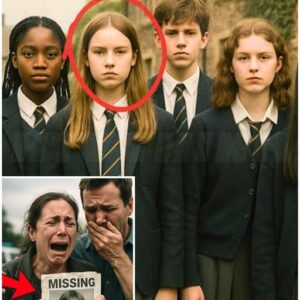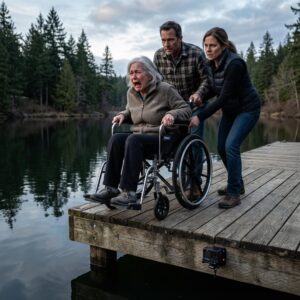The Day We Took Back the Café
My name’s Dottie. I’m 22 years old, and I’ve been hard of hearing since the day I was born. Life for me has always been like standing with one foot in each world — the hearing world, where people expect me to speak and lip-read, and the deaf world, where my hands say more than my voice ever could.
I’ve gotten used to people staring. Whispers don’t really bother me anymore. But that day? That day was different.
It started like any normal Tuesday. I pushed open the glass doors of Rosewood Café, a cozy little spot filled with the smell of cinnamon rolls and warm bread. I spotted my best friend Maya right away, already waiting at our favorite corner table. Her wavy hair bounced as she laughed at something on her phone.
Unlike me, Maya can’t hear at all. She’s completely deaf. But we’ve never let that come between us. In fact, it’s brought us closer. We’ve had entire conversations in packed rooms without saying a word, cracking up while everyone around us stared, wondering what was so funny.
As I walked up, Maya looked up and grinned. She signed with a dramatic flair, “Finally! I was starting to think you chickened out.”
I signed back, flopping into the chair across from her, “Traffic was a nightmare! And Mrs. Henderson cornered me about the community garden—again.”
Maya rolled her eyes, her hands moving quickly. “That woman needs a new hobby. Preferably one that doesn’t involve interrogating twenty-somethings about composting.”
We burst out laughing. Just two friends, talking with our hands and enjoying the moment.
Then I noticed him. A little boy, maybe seven or eight, sitting three tables away with his mom. He was staring at us, eyes wide with curiosity, like he was watching something magical.
I smiled and signed a simple “hello.” His whole face lit up, and he waved his fingers back, trying to copy me.
“Aww,” Maya signed, glancing over. “He’s trying to talk to us.”
But his mom didn’t think it was cute.
She grabbed his hands and hissed, “Stop that! We don’t do that.”
Our smiles faded. Maya and I shared a look. We’d seen this before — the discomfort, the judgment. Most people just looked away. But not this woman.
She kept glaring at us like we were doing something wrong.
“Should we leave?” Maya signed, smaller now, unsure.
“No way,” I signed back, my hands sharp and proud. “We belong here just as much as she does.”
But still, that old familiar knot twisted in my stomach — the one that always shows up when someone makes me feel like I’m too much just by being myself.
Suddenly, the woman stood up, her chair screeching against the floor. Her son trailed behind, head down. She stomped straight to our table.
“Excuse me,” she said, fake-nice dripping from her voice. “Could you please stop doing… that?”
I blinked. “Doing what, exactly?”
“All the hand-waving! My son is trying to eat, and you’re being extremely distracting.”
Maya froze mid-sign. I could see the fire in her eyes.
“You mean… sign language?” I asked.
“I don’t care what you call it!” she snapped. “It’s disruptive and aggressive. I shouldn’t have to explain to my child why two grown women are flailing around in public!”
The café fell silent. Every spoon, every coffee sip, every conversation stopped. All eyes were on us.
And suddenly, I wasn’t 22 anymore. I was eight again, standing in front of my third-grade class while my teacher explained why I was “different.”
But I didn’t back down.
“Actually,” I said, “this is a great moment to teach your son that people communicate in different ways. It’s not weird. It’s just different. And beautiful.”
She rolled her eyes and let out a nasty laugh. “Oh please! Don’t give me that politically correct nonsense. Everyone wants to be special these days. It’s selfish!”
Maya looked shaken. She couldn’t hear the words, but she didn’t need to. I reached across the table and took her hand.
“There’s nothing selfish about existing,” I said softly but firmly.
The woman’s voice got louder. “Existing? Is that what you call casting spells with your hands in public? It’s inappropriate! You’re making a spectacle of yourselves!”
Her son tugged her sleeve. “Mom, please—”
“Not now, Tyler!” she snapped.
That’s when someone stepped in.
James, a regular waiter at the café, walked over with a coffee pot in hand. His face was calm but firm.
“Is everything okay here?” he asked.
“No, it’s not!” the woman jumped in. “These two are waving their arms around and disturbing everyone. I think you should ask them to leave or do that somewhere else.”
James set the coffee pot down. Then he looked her straight in the eye and said:
“Ma’am, the only one causing a disturbance here… is you.”
The woman’s mouth dropped open. “Excuse me?”
“Sign language isn’t disruptive. It’s a beautiful, valid way to communicate. What’s disruptive is someone harassing others for using it.”
My eyes welled up. Not from sadness — but from the overwhelming feeling of finally being seen.
Then James turned to us with a warm smile. “Ladies, would you like some chocolate chip cookies? They just came out of the oven. On the house today.”
The woman turned beet red. “This is ridiculous! You can’t just—”
“Actually, I can,” James said. “This café doesn’t tolerate discrimination. Ever.”
From the corner of the room, someone started clapping. Then another. The sound spread like waves, quiet but strong. The whole café had chosen a side — and it wasn’t hers.
“Come on, Tyler,” she growled, grabbing her purse. “We’re leaving.”
But Tyler didn’t move right away. He looked up at his mom and asked softly, “Why were you being mean to them? They weren’t doing anything wrong.”
“Get your jacket,” she hissed, but he ignored her.
He walked up to our table, shy but brave. Then, slowly, he raised his hand and signed “I’m sorry.”
Maya’s face lit up. She signed back, “Thank you, sweetheart. You didn’t do anything wrong.”
Tyler beamed. “Can you teach me how to say ‘friend’?”
Maya showed him patiently. “Like this.”
He copied the movement. “Friend!” he whispered.
His mom rushed over and grabbed his arm. “We’re leaving. Now.”
But as they walked away, Tyler turned back one last time and signed “friend” again, his smile wide.
James came back with a plate full of warm cookies that smelled like victory. “I’m really sorry you had to go through that,” he said.
“Thank you,” I whispered, blinking back tears. “You didn’t have to say anything.”
“Yes, I did,” he replied quietly. “My brother’s deaf. I’ve seen too many people treated like they don’t matter. Not on my watch.”
Maya squeezed my hand. “You okay?”
I nodded, smiling. “Yeah. I really am.”
We stayed for another hour, eating cookies, signing, and laughing like always. Other people smiled at us, and one sweet old lady even stopped to say, “It’s beautiful watching you two talk like that. Like music for the eyes.”
As we packed up, I thought about Tyler, his curious eyes, and brave little hands. I also thought about his mom — about how fear makes people mean. But mostly, I thought about the power of kindness.
We all get to choose: build walls or build bridges. And that day, with one little boy’s courage and one waiter’s kindness, a bridge was built.
“Same time next week?” Maya asked as we headed to the door.
“Wouldn’t miss it,” I signed, head high, heart full.
Some days start ordinary. But they end with a reminder: We all deserve to exist exactly as we are.
And we’re never as alone as we think.





